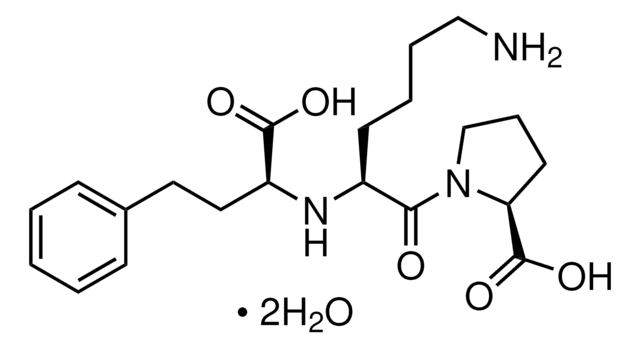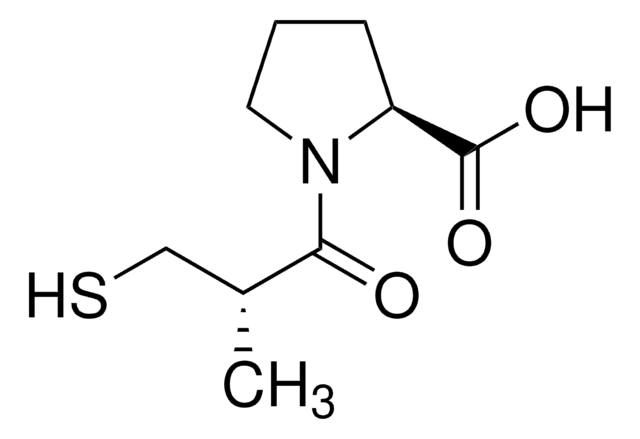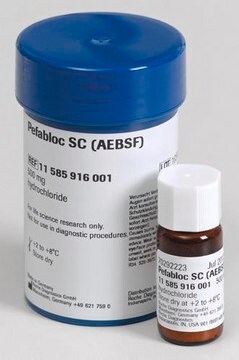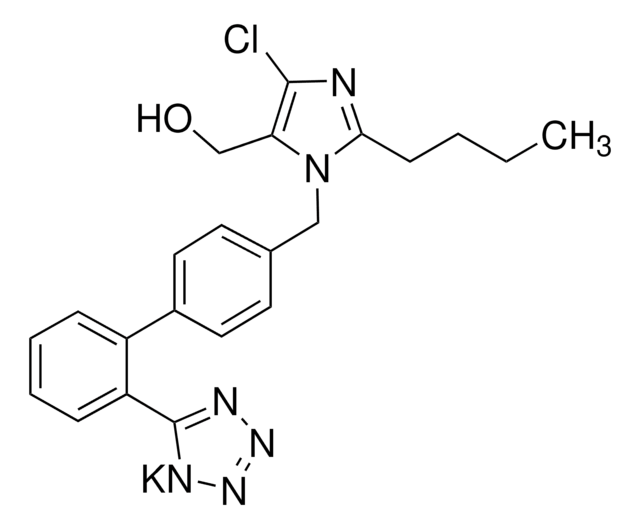L2777
Lisinopril
ACE Inhibitor
Synonym(s):
(S)-Nα-(1-Carboxy-3-phenylpropyl)-Lys-Pro
Sign Into View Organizational & Contract Pricing
All Photos(1)
About This Item
Recommended Products
General description
Lisinopril is a nonsulfhydryl angiotensin-converting enzyme (ACE) inhibitor. It is used in the treatment of heart failure and hypertension. Lisinopril is an antihypertensive and anticongestive agent, like other members of its family. It is water-soluble and possesses weak chelating properties.
Application
Lisinopril has been used as an angiotensin-converting enzyme (ACE) inhibitor:
- in combination with spironolactone, to study their effects on cardiac and skeletal muscles in the Duchenne muscular dystrophy (DMD) mice model
- standard in in vitro ACE inhibitory assay
- as a negative control in ACE enzymatic assay
Signal Word
Danger
Hazard Statements
Precautionary Statements
Hazard Classifications
Repr. 1A - STOT RE 2
Target Organs
Kidney
Storage Class Code
6.1C - Combustible acute toxic Cat.3 / toxic compounds or compounds which causing chronic effects
WGK
WGK 2
Flash Point(F)
Not applicable
Flash Point(C)
Not applicable
Personal Protective Equipment
dust mask type N95 (US), Eyeshields, Gloves
Choose from one of the most recent versions:
Certificates of Analysis (COA)
Lot/Batch Number
Don't see the Right Version?
If you require a particular version, you can look up a specific certificate by the Lot or Batch number.
Already Own This Product?
Find documentation for the products that you have recently purchased in the Document Library.
Customers Also Viewed
Comparative Effects of Low and High Doses of the
Angiotensin-Converting Enzyme Inhibitor, Lisinopril, on
Morbidity and Mortality in Chronic Heart Failure
Angiotensin-Converting Enzyme Inhibitor, Lisinopril, on
Morbidity and Mortality in Chronic Heart Failure
Milton Packer
Clinical and Investigative Medicine. Medecine Clinique Et Experimentale (2017)
E J Wallis et al.
Clinical pharmacology and therapeutics, 64(4), 439-449 (1998-11-03)
The antihypertensive response to angiotensin-converting enzyme (ACE) inhibitors may be attenuated by a compensatory decrease in atrial natriuretic factor production. If so, inhibition of atrial natriuretic factor breakdown by neutral endopeptidase (NEP) may enhance the antihypertensive effects of ACE inhibition.
Angiotensin converting enzyme inhibitors and moderate hypertension.
McAreave and Robertson Jl
Drugs (1990)
R L Hamlin et al.
Journal of veterinary internal medicine, 12(2), 93-95 (1998-04-30)
This study was designed to determine the degree of inhibition of the angiotensin-converting enzyme (ACE) in 5 normal dogs given single doses of conventionally used ACE inhibitors (ACEis). In addition the time required for that inhibition to return to 50%
M L Ricketts et al.
Clinical science (London, England : 1979), 96(6), 669-675 (1999-05-21)
In the kidney and colon 11beta-hydroxysteroid dehydrogenase type 2 (11beta-HSD2) inactivates cortisol to cortisone, thereby protecting the non-selective mineralocorticoid receptor from cortisol. Deficiency of 11beta-HSD2 results in cortisol-mediated sodium retention and hypertension, suggesting that the physiological regulation of 11beta-HSD2 in
Our team of scientists has experience in all areas of research including Life Science, Material Science, Chemical Synthesis, Chromatography, Analytical and many others.
Contact Technical Service

![N-[3-(2-Furyl)acryloyl]-Phe-Gly-Gly](/deepweb/assets/sigmaaldrich/product/structures/225/349/530bc714-b1a8-4fdb-8082-a39329ee730a/640/530bc714-b1a8-4fdb-8082-a39329ee730a.png)





